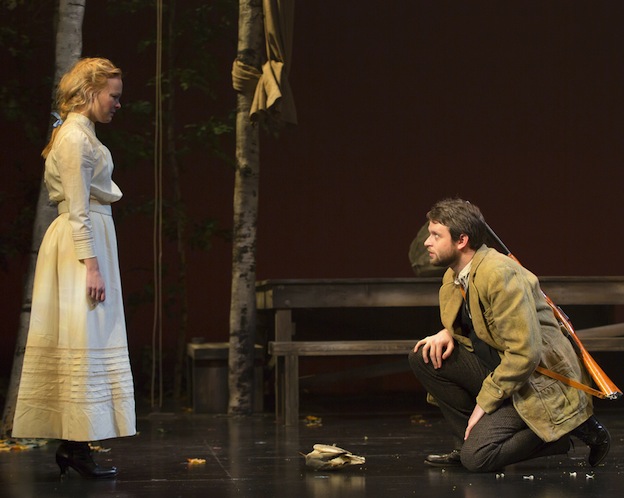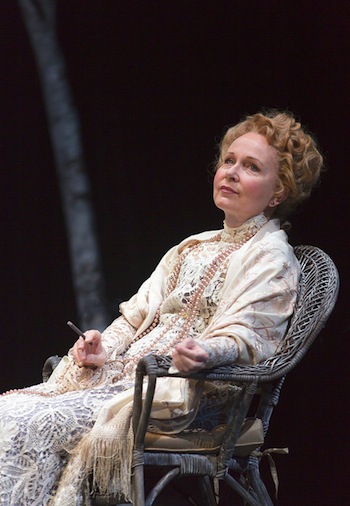Theater Review: A Languid “Seagull” at the Huntington Theatre Company
I do not remember disliking the characters in Anton Chekhov’s “The Seagull” as much as I did in this production.
The Seagull by Anton Chekhov. Translated from the Russian by Paul Schmidt. Directed by Maria Aitken. Staged by the Huntington Theatre Company at the BU Theatre, Boston, MA, through April 6.

Auden Thornton as Nina and Morgan Ritchie as Konstantin in the Huntington Theatre Company production of “The Seagull.” Photo: T. Charles Erickson.
By Iris Fanger
This endless winter, coupled with an elusive spring, has come with major stagings of two plays by Anton Chekhov in the Boston area: Actors’ Shakespeare Theater production of The Cherry Orchard, and the Huntington Theatre Company’s The Seagull, currently on the boards. Given the grayness of our skies, and the drag on our psyches of the omnipresent cold and snow, the distinctive Chekhovian atmosphere — with its impatience for a change that never comes — is irritatingly relevant.
Chekhov’s dramas (or comedies as he considered them) take place in the country where the days, months and years drag on, each like the other, at least in the minds of the people who are mired there. He lived on a small estate outside of Moscow, and, at the end of his life, in Yalta, but he loved to travel, a desire mirrored by many of his characters. The people he created are stuck in the rural parts of Russia where the winters are harsh and dark; the summers are a time of pervasive light and social encounters, embellished as the characters age by outsized memories of the sunshine and its possibilities. The stifled hopes of their lives only heightens their nostalgia for a carefree life that never was. Unlike Chekhov, who worked continually up to his death from tuberculosis in 1904, many of the people in his plays do nothing at all.
Although The Cherry Orchard has a central narrative through-line, The Seagull covers varied subjects: the plight of of talent versus the general acclamation of mediocrity by the marketplace, the ruination of an innocent young woman, the inability of unhappy people to take actions leading to change, and the gulf between the haves and have-nots, in terms of personal fulfillment. The milieu of the countryside, the lake and the trees surrounding the manor house, in contrast to the latter’s stuffy, faded rooms, looms over all, as if the ongoing cycle of life in Mother Russia remained both the central obsession for her people and their determining fate.
Director Maria Aitken has mounted a detailed but generally languid staging of The Seagull, studded by moments when the servants are seen through a scrim at the beginning of each act. At first, the peasants are building the outdoor stage for young Konstantin’s experimental play, at the edge of the lake on his mother and uncle’s property. The other three acts, set inside the house, begin with the unnamed servants bustling around as they re-arrange the furniture for the comfort of the land owners and carry in the samovar for tea. The emphasis on the setting, designed by Ralph Funicello and lighted in varying degrees of shadow by James F. Ingalls, is exactly right because it reminds us of the elemental connection between Chekhov’s plays and the specific time and place in which he lived. We’re not likely to see his works staged in modern dress and set in another country, in contrast to the now routine updating of Shakespeare’s plays.
However, despite the emphasis on the servants and the setting, I do not remember disliking The Seagull‘s major characters as much as as I did in this production. Other than Nina, the glowing young woman, who is a special case, and Dorn, the doctor, who hovers removed from the ineffectual actions of the others, the inhabitants of the estate and its visitors are mostly an unpleasant lot, totally self-absorbed in their own unhappiness. It’s as if they need to be soundly shaken and made to look at the people around them, to recognize other needs than their own narcissistic desires.

Kate Burton as Arkadina in the Huntington Theatre Company production of “The Seagull.” Photo: T. Charles Erickson.
Kate Burton as Arkadina, illuminated by an inner life force that keeps her going, despite her fears of competition and growing old, is as selfish a woman as exists, the character’s egotism emphasized as much by the actress’ gestures and knowing looks as by Chekhov’s dialogue. For all of Arkadina’s beauty and charisma, notably an energy that’s lacking in the other figures, she’s a mean cheapskate, unable to expend her resources or her affections for anyone else’s benefit. No one believes her professed love for her son, whom she keeps as far away from her as possible: he is exiled to the country in order to preserve her fraying self-image of youthfulness. In the HTC production there is too little dramatic connection between her and Konstantin, portrayed by Burton’s son, Morgan Ritchie, a handsome young man who needs some loosening up in the role. Nancy E. Carroll makes the long-suffering Paulina into a memorable cameo.
Ted Koch as Trigorin, the writer taking notes on everything that happens, is Arkadina’s younger lover. He is also the man who ruins Nina’s life and then leaves her. Koch, too, is somewhat bland, except in the brief scene where he draws genuine inspiration from the young woman’s youth and beauty. The only other likable character is Arkadina’s brother, Sorin, played by Tom Derrah as a man who is determined to maintain a vital presence even though he is well past his prime. Despite his protestations of a wasted life, he has emotions to spare for his sister and nephew and is less self-absorbed, although he is circumscribed by his fraility.
The find of the ensemble is Auden Thornton as Nina, blond and delicate, passionate if somewhat vacuous in her pursuit of celebrity by way of an acting career, partly fancying Trigorin for his fame. Chekhov has stacked the deck against her: she’s an orphan left out of her wealthy mother’s will, a questionable talent, and a dreamer whose goals are somewhat specious. However, she is the last one left standing despite her deprivations as the play ends, disheveled but determined to create a career, even if it means working in a third-rate theater in the provinces.
The symbolism of the seagull has always been obvious: carelessly shot by Konstantin in the second act, stuffed, mounted, and then forgotten by Trigorin later on, finally serving as a surrogate image for Nina at the end. Thanks to Tufts University Professor Laurence Senelick, an expert on Russian drama, the mystery of a seagull’s appearance on a land-locked lake in the middle of Russia has been solved. Senelick explains in his excellent Anton Chekhov, The Complete Plays that the word in Russian means “gull,” and that the term “seagull” was the result of translations. One problem in this multi-leveled drama solved, but even for the notoriously nuanced Chekhov the script remains filled with ambiguous meanings and unresolved relationships.
Iris Fanger is a theater and dance critic based in Boston. She has written reviews and feature articles for the Boston Herald, Boston Phoenix, Christian Science Monitor, New York Times, and Patriot Ledger as well as for Dance Magazine and Dancing Times (London).
Former director of the Harvard Summer Dance Center, 1977-1995, she has taught at Lesley Graduate School and Tufts University, as well as Harvard and M.I.T. She received the 2005 Dance Champion Award from the Boston Dance Alliance and in 2008, the Outstanding Career Achievement Award from the Graduate School of Arts and Sciences at Tufts. She lectures widely on dance and theater history.
Tagged: Anton Chekhov, Huntington-Theatre-Company, Kate Burton, Maria Aitken, Paul Schmidt

